Related Research Articles
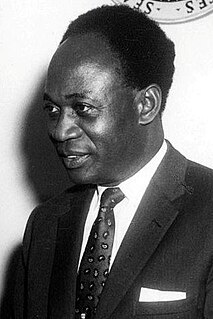
Kwame Nkrumah was a Ghanaian politician, political theorist, and revolutionary. He was the first Prime Minister and President of Ghana, having led the Gold Coast to independence from Britain in 1957. An influential advocate of Pan-Africanism, Nkrumah was a founding member of the Organization of African Unity and winner of the Lenin Peace Prize from the Soviet Union in 1962.
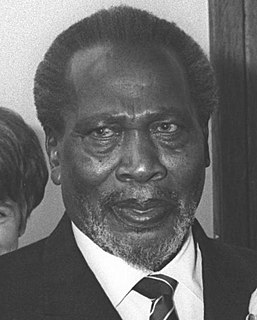
Jomo Kenyatta was a Kenyan anti-colonial activist and politician who governed Kenya as its Prime Minister from 1963 to 1964 and then as its first President from 1964 to his death in 1978. He was the country's first indigenous head of government and played a significant role in the transformation of Kenya from a colony of the British Empire into an independent republic. Ideologically an African nationalist and conservative, he led the Kenya African National Union (KANU) party from 1961 until his death.

Julius Kambarage Nyerere (Swahili pronunciation: [ˈdʒuːlius kɑmˈbɑɾɑgɑ ɲɛˈɾɛɾɛ]; was a Tanzanian anti-colonial activist, politician, and political theorist. He governed Tanganyika as Prime Minister from 1961 to 1962 and then as President from 1963 to 1964, after which he led its successor state, Tanzania, as President from 1964 to 1985. He was a founding member and chair of the Tanganyika African National Union party, and of its successor Chama Cha Mapinduzi, from 1954 to 1990. Ideologically an African nationalist and African socialist, he promoted a political philosophy known as Ujamaa.

African socialism or Afrosocialism is a belief in sharing economic resources in a traditional African way, as distinct from classical socialism. Many African politicians of the 1950s and 1960s professed their support for African socialism, although definitions and interpretations of this term varied considerably. These politicians include Julius Nyerere of Tanzania, Kwame Nkrumah of Ghana, and Modibo Keita of Mali, among others.
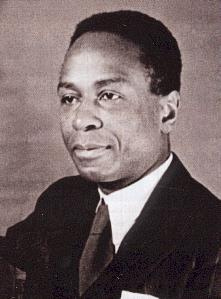
George Padmore, born Malcolm Ivan Meredith Nurse, was a leading Pan-Africanist, journalist, and author. He left his native Trinidad in 1924 to study medicine in the United States, where he also joined the Communist Party.
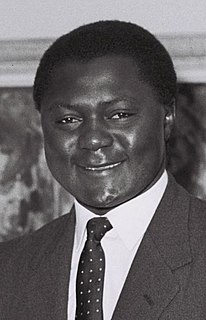
Thomas Joseph Odhiambo Mboya was a Kenyan trade unionist, educator, Pan-Africanist, author, independence activist, and statesman. He was one of the founding fathers of the Republic of Kenya. He led the negotiations for independence at the Lancaster House Conferences and was instrumental in the formation of Kenya's independence party – the Kenya African National Union (KANU) – where he served as its first Secretary-General. He laid the foundation for Kenya's capitalist and mixed economy policies at the height of the Cold War and set up several of the country's key labour institutions.
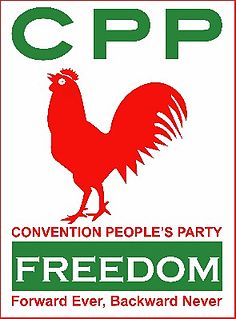
The Convention People's Party (CPP) is a socialist political party in Ghana based on the ideas of the first President of Ghana, Kwame Nkrumah. The CPP was formed in June 1949 after Nkrumah broke away from the United Gold Coast Convention (UGCC). Nkrumah was the then appointed Secretaty General of the UGCC when he was arrested by the leader of the UGCC and imprisoned for an alleged thought, plans and power against Kwame Nkrumah's leadership. Kwame Nkrumah then formed the Convention People's Party with support of some UGCC members and had a purpose for self governance. Upon Kwame Nkrumah's leadership with the CPP, he orgranized a non violent protest and strike for support of the purpose for self-governance which took him to imprisonment for a second time, but he was released after winning a massive vote by the CPP following the colonies election general election whilst he was in prison. The CPP followers supported Nkrumah's ideas and voted for him massive for power of self-governance. The articles discussed about the origins of Ghana political parties, the 1948 riot and the birth of the Convention People Party among others. Issues that led to the formation of the CPP, struggles with the colonial powers led by Kwame Nkrumah and finally the attainment of Ghana's independence were part of the key concerns for this write up.
Joseph Emmanuel Appiah, MP was a Ghanaian lawyer, politician and statesman.
Kingsley Ozumba Mbadiwe (1915–1990) was a Nigerian nationalist, politician, statesman and government minister in the Nigerian First Republic.

The East African Federation is a proposed political union of the six sovereign states of the East African Community – Burundi, Kenya, Rwanda, South Sudan, Tanzania and Uganda – as a single federated sovereign state. In September 2018, a committee was formed to begin the process of drafting a regional constitution, and a draft constitution for the confederation was set to be written by the end of 2021 with its implementation by 2023; however, it is likely that this deadline will be missed.
The Pan-African pellet compass is a sociopolitical and militaristic device called "the next necessary development of Pan-Africanism" by Ghana leader Kwame Nkrumah, who first introduced the concept in 1968 in his Handbook for Revolutionary Warfare. Following his claim that war is "logical and inevitable" the pellet compass was intended to determine the maximum resistance offered by revolutionary nations seeking to become incorporated into the macroeconomic totality of the Pan-African movement. The name derives from the unique militaristic procedure proposed by Nkrumah based on the covert operations possible with air guns and airborne pellets.
Freedomways was the leading African-American theoretical, political and cultural journal of the 1960s–1980s. It began publishing in 1961 and ceased in 1985.
T. Ras Makonnen was a Guyanese-born Pan-African activist of Ethiopian descent.
Dorothy Pizer or Dorothy Padmore was a British working-class anti-racist activist, secretary and publishing worker. In the 1940s and 1950s she was the partner, supporter and collaborator of Pan-African activist and Communist George Padmore.

Elizabeth II was Queen of Tanganyika from 1961 to 1962, when Tanganyika was an independent sovereign state and a constitutional monarchy. She was also the monarch of other sovereign states, including the United Kingdom. Her constitutional roles in Tanganyika were mostly delegated to the governor-general of Tanganyika.

Presidential elections were held in Kenya on 8 November 1978, the first not to be held concurrently with parliamentary elections. They followed the death in office of President Jomo Kenyatta in August 1978. The then-Vice President, Daniel arap Moi, who was sworn in as Acting President for a 90-day interim period beginning at the moment of Kenyatta's death, was the sole candidate and was automatically elected without a vote being held.

The presidency of Jomo Kenyatta began in 12 December 1964, when Jomo Kenyatta was named as the 1st president of Kenya, and ended on 22 August 1978 upon his death. Jomo Kenyatta, a KANU member, took office following the formation of the republic of Kenya after independence following his efforts during the fight for Independence. Four years later, in the 1969 elections, he was the sole candidate and was elected unopposed for a second term in office. In 1974, he was re-elected for a third term. Although the post of President of Kenya was due to be elected at the same time as the National Assembly, Jomo Kenyatta was the sole candidate and was automatically elected without a vote being held. He died in 22 August 1978 while still in office and was succeeded by Daniel arap Moi.
Ivor Agyeman-Duah is a Ghanaian academic, economist, writer, editor and film director. He has worked in Ghana's diplomatic service and has served as an advisor on development policy.

Pan-Africanism is a cultural and political ideology calling for the unification of the various African communities and their diasporadic counterparts for the purpose of empowering each other. The heights of the movement is primarily characterized in the west by the black nationalist struggles of Marcus Garvey, and the push for greater self determination by W.E.B Du Bois during the early twentieth century. The literature is much vaster once one leaves the western world and enters the African continent, where one can find a consistent effort in much of the territory to unify themselves against the common enemy of Imperialism. Pan-Africanism's influence can be characterized through its contributions to art, media, and politics.
The Nairobi People's Convention Party (NPCP) was a Nairobi based political party formed in 1957 by Tom Mboya. This party played a crucial role in the fight for Kenya's independence. Despite attempts at suppression from the colonial government, the NPCP managed to mobilise Africans in Nairobi to further the nationalist cause and fight for independence from Britain. Following Jomo Kenyatta's release from detention in 1961, the NPCP merged with the Kenya African Union (KAU) and Kenya Independence Movement (KIM) to form the Kenya African National Union (KANU).
References
- 1 2 Assensoh, A. B.; Alex-Assensoh, Yvette M. (2013). Malcolm X: A Biography. Greenwood. ISBN 978-0-313-37849-2.
- 1 2 3 "A.B. Assensoh". African American and African Diaspora Studies. Retrieved 2020-12-14.
- ↑ Who's who in U.S. Writers, Editors & Poets. December Press. 1989. ISBN 978-0-913204-22-1.
- 1 2 3 4 5 6 7 8 9 10 11 12 13 14 15 16 Who's who in U.S. Writers, Editors & Poets. December Press. 1989. ISBN 978-0-913204-22-1.
- ↑ "Yvette Alex-Assensoh". School of Law. Retrieved 2020-12-14.
- ↑ Assensoh, A. B. (1978). Kwame Nkrumah: Six Years in Exile, 1966-1972. Stockwell. ISBN 978-0-7223-1182-0.
- ↑ Assensoh, A. B. (1985). Africa in Retrospect. Stockwell.
- ↑ Assensoh, A. B. (1987). Rev Dr Martin Luther King, Jr. and America's Quest for Racial Integration: With Historical Testimonies from King's Former Class-mate, Close Friends and Colleagues. Stockwell. ISBN 978-0-7223-2084-6.
- ↑ Assensoh, A. B. (1989). Kwame Nkrumah of Africa: His Formative Years and the Beginning of His Political Career, 1935-1948. Stockwell. ISBN 978-0-7223-2317-5.
- ↑ Assensoh, A. B. (1998). African Political Leadership: Jomo Kenyatta, Kwame Nkrumah, and Julius K. Nyerere. Krieger Publishing Company. ISBN 978-0-89464-911-0.
- ↑ Assensoh, A. B.; Alex-Assensoh, Y. (2002-01-12). African Military History and Politics: Coups and Ideological Incursions, 1900-Present. Palgrave Macmillan. ISBN 978-0-312-24039-4.
- ↑ Assensoh, A. B.; Alex-Assensoh, Yvette M. (2016). Malcolm X and Africa. Cambria Press. ISBN 978-1-60497-924-4.